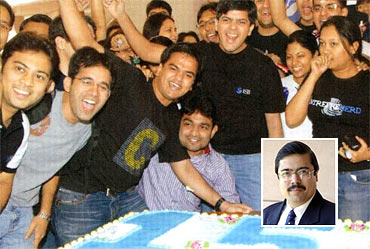
An MBA degree seems to be the most popular answer to all career woes today. As our country and culture are both bourgeoning with management degrees, institutions, and graduates, there are still a few people in the academic sphere who are trying to take a deeper look at what management studies is all about.
What does an MBA mean in the first place? Is every student who appears for the CAT interested in learning or is it all only about getting into a fancy brand and huge pay package? Shyam Vishwanathan, ex-dean of the Indian School of Business (ISB) in Hyderabad and the current executive director of SOIL (School of Inspired Leadership), Gurgaon, that had its first batch pass out in 2010, tries to bust some of the myths that surround MBA education.
Why should someone study management?
MBA is a way of life and living. It can help you at a strategic level in any industry; no matter what business it is that you wish to pursue. The main perspective behind doing an MBA, personally for me, is that it helps a person to be trained and to enter the industry faster.
What may take you twenty five years to learn on the job, can be taught within a year. This saves crucial time. The person doesn't have to get trained once they join the work force; doing an MBA means they can simply hit the road running.
There are six basic areas of expertise in management that one must be familiar and trained well in. These include strategy, finance, marketing, operations, technology, and finally human resources. If you can add the dimension of also being a good citizen, it is a perfect training for life.
What are some of the key problems with management studies today?
What we are involved with is creating job seekers rather than job creators. The problem is that the entire conversation is focussed too heavily on job placements: which includes brand names and salaries. An MBA degree seems to have become a passport to getting a fancy job.
As a result, what we are churning out is people who are going out looking for jobs rather than creating them for other people. What we need is entrepreneurship. Sadly, there's very little emphasis on this.

What do you look for when you select students to join your programmes?
There is a problem with selection procedures across institutions in the country, be it whether the student is appearing for CAT, GRE, GMAT, or the CET exams. All of the entrance tests solely measure a person's logical reasoning skills, and mathematical skills. There are a lot more ways to measure intelligence: these are only some of the things that make a person adept to be a leader. Some of the greatest leaders are not all necessarily good only at mathematics -- we need to see other things too: interpersonal intelligence and linguistic intelligence for instance. Merely for logical reasoning skills, it is unfortunate that the industry should lose so much of good talent, and that young people who could succeed given the opportunity are unable to do so.
We need to see how a person is unique in their own way, and how their strengths can be leveraged. For this reason, we have no entrance test at SOIL: the selection is done only through an interview, where we try to bring out the best in a person rather than the worst. Our course is different, firstly because we have a unique selection procedure, and secondly, we have an entire consortium and host of companies that are involved in the academic board. These organisations are involved in the formulation of the curriculum as well as our selection procedure. This is what makes us different: our selection process, our teaching methods, the way we treat students, and our reinforcement of strong moral ethics and values: not just skills.
What is it that makes a good manager and is personality an important factor for a manager?
While it is important to learn how to be successful and make money, it is also important to believe in ethics. There is very little being discussed at management schools about ethics. It is important to be concerned about other people, and be responsible toward the environment. There is practically no MBA curriculum that focuses on these values. Because of this, we are producing managers who are often irresponsible people, and care little about society.
While behaviour is a defining factor in the way a person manages their organisation, it is also important to acknowledge that we have had all kinds of great leaders, with different personalities, and that it is not necessary for everyone to be the same. There are some people who are extremely outgoing for instance, and might succeed due to their social skills, while there are others who may be introverted, and instead provide a great value addition in terms of their knowledge and depth in a particular subject. We have had all kinds of leaders, from Napoleon to Julius Caesar to Mahatma Gandhi, and all of them had a variety of different personalities. Every unique individual can succeed and be a strong leader, with the right kind of guidance, coaching, and mentoring.

What inspired you to start the School of Inspired Leadership?
There were two or three dreams that we had. We realised that there was firstly too much of undue emphasis on job placements, which we believed was something that should change. Secondly, we felt that there were a lot of negative messages going out to the youth through the media, simply because of the way society is: there is a lot of corruption today. We felt that there weren't enough good role models in society, and that it is important to teach people to be good, moral and ethical citizens. These were some of the ideas that we had at the time when the board came together and we decided to begin the programme.
So can management be 'taught' or is it something that one must learn through actual practice?
This is precisely the reason why it is important for a person to come with work experience. Too many people who are fresh out of college and have never worked in the industry are walking away with MBA degrees, and having worked for a couple of years -- I'd say at least three to four years -- can really enhance the academic learning later. It is also extremely important for MBA institutions to realise that while setting the curriculum, students are sent out into the field, and are not confined to the classroom alone. We do send students out a lot to work on projects and then come back and share them with each other. At the end of it, there is a lot of sharing, and it helps tremendously.

In time of so much hype surrounding an MBA, how does one know whether pursuing a management degree is a good idea for them?
MBA today has become a sort of movement, and there is a lot of social pressure around it. It has become like an almost done thing. This is not good, and I believe that people should pursue what they want to do and what they love. There are many careers, and MBA should not be the only one. What an MBA can help you in applies to every area of life, and you can then later move into the industry of your choice.
What would you advise aspiring MBA students?
I would say that before one joins an MBA course they must prepare themselves for an enormous amount of group discussions and debates because this constitutes a large part of the programme. You must learn to listen attentively and know how to put your point across assertively, without getting too aggressive, and say what you have to say clearly.
The other thing that it is important to make sure you are adept with is computer and Internet skills. You will need to do a lot of research on the Internet before presenting it, and you must learn and make something out of it originally and quickly without plagiarising. This requires you to know how to search for information fast, and how to go about it and where to find it from.
The two other things that I would emphasise and encourage young MBA aspirants to follow is that firstly, one should not try to focus too much on the name of the organisation or brand or the salary package in the first job. The most important thing that you must seek is to choose working with an organisation that is offering you the opportunity to do what you enjoy doing. It is important to focus on the content of the job rather than anything else, and be able to add value.
Next, focus on building a strong foundation and specialise on your area of expertise -- be it strategy, or human resources, or marketing or finance, before later going ahead and becoming a general manager.
What I would finally also say is that if you can be an entrepreneur -- and you want to start something up on your own -- please do it. There is nothing like it if you want to be a job creator rather than a job seeker, and it will be a great service if you do so.